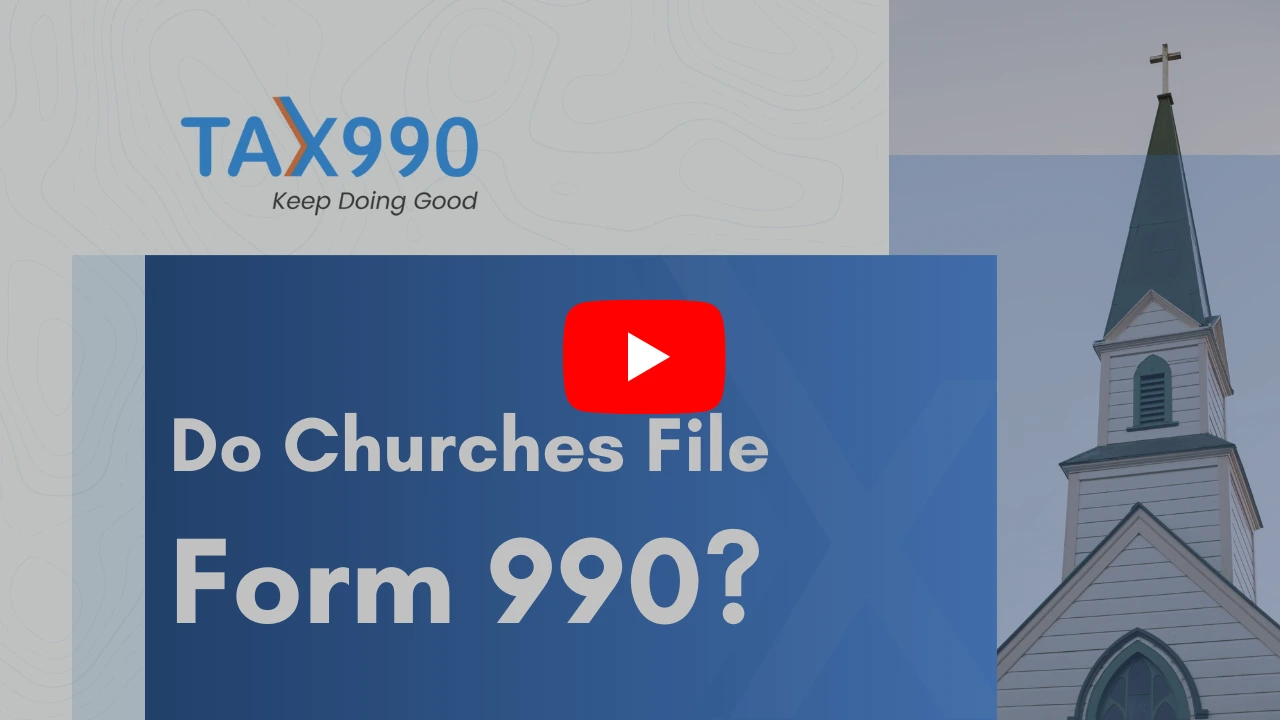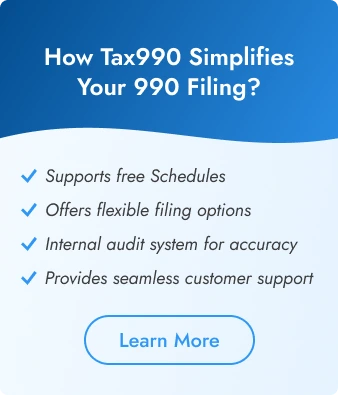Understanding Tax Compliance for 501(c)(3) Churches
- Updated March 25, 2024 - 2.00 PM - Admin, Tax990
Staying tax compliant is a crucial responsibility for any type of organization, and churches are no exception. Typically, the IRS classifies the churches under 501(c)(3) for federal tax-exempt purposes. Furthermore, the IRS has established distinct requirements and guidelines for churches to ensure
tax compliance.
This article elaborates on these requirements, starting from how churches can be eligible for tax-exempt status and what their annual filing requirements are!
Table of Contents
How Does the IRS Define Churches?
The term ‘Church’ is not specifically defined in the Internal Revenue Code (IRC). However, the IRS considers the following organizations as Churches for federal tax purposes.
- Churches
- Church conventions
- Church associations
- Integrated Auxiliaries of churches
- All other organizations associated with churches
- Mosques, Synagogues, and certain other religious organizations
Other Religious Organizations
Religious organizations that are not considered churches may include Nondenominational Ministries, Interdenominational and Ecumenical organizations, and other entities that operate toward the advancement of religion. These organizations may have exemption and filing requirements slightly different from what the churches have.
How Can Churches Obtain Tax-Exempt Status?
Unlike the other nonprofits that are typically required to submit an application (Form 1023 or 1024) to the IRS for exemption, churches are automatically qualified as tax-exempt organizations under section 501(c)(3). However, to be eligible for automatic exemption, the churches must fulfill the following requirements:
- Should not benefit any private shareholders
- Should not be attempting to influence legislation through any activities
- Should not interfere in political campaigns
- Should not be part of any illegal or other activities that violate fundamental policy
Though they are automatically exempt, churches may still file Form 1023 or 1024 voluntarily to improve their recognition among the church leaders and members and provide more assurance to the public that their contributions are tax-deductible.
Note: Automatic exemption applies only to organizations defined as churches. Other religious organizations must still file Form 1023 or 1024 unless their gross receipts are ≤ $5000.
Do Churches File a 990 Form?
All the organizations that obtained tax-exempt status from the IRS are required to file Form 990 every year to report their financial information, activities, and other details. However, Churches are exempt from this requirement and are not required to file Form 990 annually.
What this also means is that Churches are not subjected to automatic revocation of tax-exempt status even if they fail to file the 990 forms. The exception also applies to other organizations affiliated
with Churches.
Significance of Filing Form 990 for Churches
Even if the IRS doesn’t require churches to file a 990 return every year, there are a number of reasons why churches should file Form 990.
- Financial Transparency - By filing a 990 form and making it available for public inspection, churches can improve their financial transparency among the public.
- Build Trust - Form 990 provides the churches with one way of boosting public integrity and building trust among the contributors.
- Testimony - A Form 990 filed by the church can also serve as documented evidence, i.e., testimony for all the exempt activities and program service accomplishments they carried out.
Form 990 Filing Requirements for Churches
If the churches choose to file 990 returns, they must file the applicable form and follow the same guidelines and filing requirements as other nonprofits. There are different variants of Form 990 available, and churches must choose and file the one that is appropriate to them.
- Form 990-N (e-postcard) - If the gross receipts value of a Church is $50,000 or less, they can
file Form 990-N - Form 990-EZ (Short Form) - If the gross receipts value of a Church is less than $200,000 (and) the value of the assets is less than $500,000, they can file Form 990-EZ.
- Form 990 (Long Form) - If the gross receipts value of a Church is $200,000 or more (or) the value of the assets is $500,000 or more, they can file Form 990.
In addition, churches that generate $1000 or more from unrelated business income may also file Form 990-T
Additional Filing Requirements
Churches that choose to file 990 returns must ensure that they file a complete return with the required 990 Schedules. Based on their financial status and operations, they may be required to include a few Schedules along with their 990 forms. Learn more about Schedules
Tax 990 is Here to Simplify 990 Filings for Churches!
Since the IRS has mandated the e-filing of 990 forms, Churches need to get started with an e-file provider. That’s where Tax 990 comes in!
Tax 990, the IRS-authorized e-file provider, enables churches to complete and e-file their 990 returns easily, securely, and quickly. Here are some of the exclusive features that Tax990 offers.
- Free Schedules - Automatically includes the required 990 Schedules for Free.
- Easy Form Preparation - Form-Based and Interview-Style filing options for seamless form preparation.
- Internal Audit Check - Audits your form and notifies you of errors before you transmit it to the IRS.
- Reviewers and Approvers - Provides the option to invite users to review and approve forms.
- Real-time Status Updates - Receive instant updates on forms via email and text notifications
if desired. - Seamless Customer Support - Resolves questions instantly via live chat, phone, and email.



